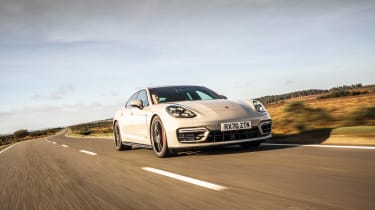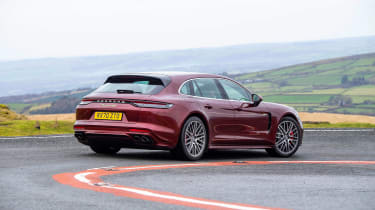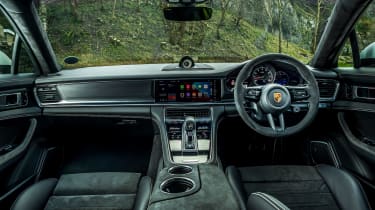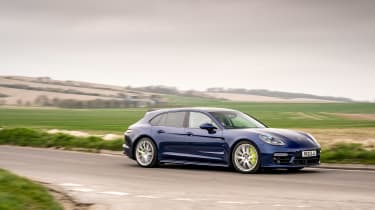Porsche Panamera (2016 - 2024) review – does it still have a place in the new Taycan world?
A beautifully built expression of Porsche’s engineering might, yet the Panamera is starting to look its age
The Porsche Panamera is the German marque’s large luxury fastback and estate that represent the upper end of the passenger car range. Rather than being a four-door take on the iconic 911, as its design sometimes alludes to, its talents instead lie in its stunning refinement, peerless build quality and exceptional engineering depth.
All variants are powered in this second generation by petrol V6 and V8 engines, with or without hybrid assistance, highlighted for us by the pure combustion GTS and Turbo S models. The hybrid variants don’t drive quite as well, but they have a different set of skills including an all-electric range of around 30 miles that will allow some owners largely all-electric motoring depending on their circumstances.
Underpinning the Panamera is the MSB platform shared with the Bentley Continental GT and Flying Spur, putting into context how luxurious it was designed to be from the outset. It’s not quite as opulent as the Bentley, though, and while it is well equipped, for the full experience you will need to dip into the options list – this is still a Porsche, after all.
And if a hatchback isn’t quite for you, Porsche’s Sport Turismo estate variant matches all of the standard car’s attributes in a slightly more practical package. Specified as such, the Panamera really is in a class of its own, and if you can stomach the high purchase price there are fewer more complete cars on sale right now.
Porsche Panamera in detail
- > Engine and gearbox and technical highlights – Hot-V turbocharged engines are paired with a sharp eight-speed dual-clutch transmission. Hybrids come in V6 or V8 flavours
- > Performance and 0-60 time – The 4-litre V8 endows Turbo models with phenomenal performance; lesser versions are hardly slow, too
- > Ride and handling – For such a big and heavy car, the Panamera has incredible poise and control
- > MPG and running costs – Standard V6 and V8 models are thirsty, but make use of the E-Hybrids’ battery pack and it will hike up the MPG
- > Interior and tech – The interior is both superbly built and very high-tech
- > Design – Imposing, substantial and well detailed, this is not a delicate design, but it is a resolved one
Prices, specs and rivals
Porsche has recently restructured its Panamera range with even more variety, there’s now no less than eight different drive and powertrain options, in two body styles, not including seasonal special editions like the current Platinum Edition.
More reviews
Long term tests
Reviews
The new structure essentially sees the pure-combustion Panamera range grow to include a base rear-wheel-drive model (£72,900), an all-wheel-drive 4 (£75,900), 4S (£96,000), GTS (£110,700) and Turbo S (£141,400). These are then joined by three hybrid options: an entry 4 E-Hybrid (£86,700), 4S E-Hybrid (£105,300) and Turbo S E-Hybrid (£145,900). The estate-like Sport Turismo adds between £2200 and £3000 to the total depending on the powertrain, but is otherwise identical to the hatchback in specification.
> Read about our experience in the Porsche Panamera Turbo S E-Hybrid
Equipment varies between the different powertrains, but the base, S, GTS and Turbo S levels generally keep consistent regardless of hybrid or non-hybrid engines. Base-level cars don’t have the level of standard equipment you might expect given a £70,000-plus price tag, but the basics are there, including a chunky set of six-piston brakes, adaptive dampers paired to coil spring suspension, 19-inch wheels, heated partial leather seats and Porsche’s slick PCM infotainment system.
On top of its higher performance figures, the mid-level S models swap out the coil springs for Porsche’s triple-chamber air system, and include higher-specification chairs with more electric adjustment and a full-leather finish.
From here, GTS models start to really pack in the kit, not just gaining a couple of extra cylinders, but also including the Sports Chrono Package with a mode selector on the steering wheel, a larger brake package behind 20-inch wheels, sportier exterior styling with black badging and detailing, a sports exhaust system, four-piece fold-out active rear wing, an Alcantara interior package covering Porsche’s sports seats… we could go on. Curiously, rear-wheel steering and Porsche’s PTV or torque vectoring rear differential are still on the options list.
Turbo S models are fully loaded, bundling the aforementioned PTV differential and rear-wheel steering with an active anti-roll system called PDCC. Huge 420mm carbon-ceramic brakes on ten-piston front calipers are also included, sitting behind 21-inch wheels. They also grab upgraded active LED headlights, a bunch of upgraded material finishes inside including an Alcantara headlining and smooth leather seats, a head-up display and Bose sound system. Of course, personalisation is a big earner for luxury brands in 2022 so the options list is still vast, even at this top-end level. Keep ticking those boxes and you’ll spec a Panamera Turbo S E-Hybrid Sport Turismo to over £200,000.
The Panamera largely sits in its own place in the market, with only Mercedes-AMG offering a direct rival with the pace, technology and luxury to compete. The AMG GT 4-Door has only just been recently updated, but only the GT63 S 4Matic+ and GT63 S E Performance are being offered here in the UK, rivalling the Turbo S and Turbo S E-Hybrid.
> Read our review of the Panamera Sport Turismo Turbo
The AMG is actually even more expensive than the Porsche, with the GT63 S starting at £150,440, but aside from a few exclusive exterior colours and interior leather options, is packed to the brim with features. The two share identical power figures at 621bhp, but the Porsche is a tad faster to 62mph, despite having a slight deficit in torque.
The plug-in hybrid AMG GT63 S E Performance costs an eye-watering £173,705, but the same applies in regards to specification. It’s also considerably more powerful than the Porsche with 831bhp compared to 691bhp. We have yet to see what AMG’s new hybrid system is like on the road - we’ll report back when we do.
On the other end of the spectrum is BMW’s 8-series Gran Coupe, itself just having undergone a mild update. There are three options here - an entry six-cylinder petrol 840i at £76,975 that rivals the base Panamera, the 523bhp M850i at a similar price and performance point to the GTS at £107,420, and at the top of the tree the £130,520, 616bhp M8 Competition Gran Coupe.
In contrast to the Porsche, in which the more inexpensive GTS is the more aggressively performance-oriented of the two V8 options, BMW’s M850i is the more laid-back character compared to the slightly unhinged (but very entertaining) M8 Competition. This is also reflected in the M8’s technical package, featuring simpler coil springs and a deselectable all-wheel-drive system. Carbon brakes are an £8000 option, though, when specified as part of the M Pro Package.
Audi’s RS7 is a potential in-house rival for the GTS model, too, with the added bonus of its 592bhp V8 hitting harder for less cash. Look outside of the obvious rivals and you’ll also find a selection of high-end, high-performance EVs such as the Taycan and Audi RS e-tron GT. Both feel a different generation to the Panamera, and despite being smaller on the inside, will likely appeal to a similar customer base.
For less money again, the traditional supersaloon also appeals, with the BMW M5 Competition, Audi RS6 and Mercedes-AMG E63 S all hovering at around £100,000 with around 600bhp.








